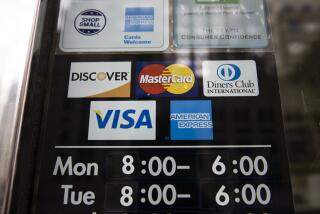Current Account Deficit Hits $34 Billion in Quarter
- Share via
WASHINGTON — The U.S. current account deficit, a broad measure of trade performance, hit a record $34.73 billion in the second quarter, pushing the country deeper into the hole as the world’s largest debtor nation, the Commerce Department reported Tuesday.
The department said the imbalance in the current account for the April through July period was 2% higher than the previous record deficit of $34.04 billion, which was recorded in the first three months of this year.
According to the report, the United States’ balance of trade in merchandise actually improved between April and June, but that was more than offset by other spending such as higher foreign aid.
The deficit on merchandise trade eased by $400 million from comparable first-quarter levels to $36 billion, but imports were up by $700 million, accounting for the higher overall deficit.
Includes Services
The current account measures not only trade between countries in merchandise but also services, primarily reflecting investment earnings, and such transfer payments as foreign aid.
Up until five years ago, the United States was running surpluses in its current account as earnings on Americans’ investments overseas were enough to offset deficits on merchandise trade.
However, the nation sustained a record $117.68-billion current-account deficit last year, and analysts are predicting this year’s imbalance could top $140 billion.
The soaring trade deficit has been blamed for widespread job losses and a slump in American manufacturing. The deficits in the current account have pushed the United States in just three years from the world’s largest creditor to the world’s biggest debtor. That means foreigners now own more U.S. investments than Americans hold abroad.
The U.S. was in hock to the rest of the world by a total of $107.44 billion at the end of 1985. The new figures on the current account indicate that debt is now approaching $160 billion, far surpassing the $103.7-billion debt of the previous leading debtor nation, Brazil.
Discounted by Reagan
President Reagan has discounted the country’s rapid debt buildup, contending that it shows America is a good investment opportunity. However, private economists have expressed fears that the U.S. economy could end up being held hostage to the whims of foreign investors.
They also said any improvement will be a slow process.
“The trade deficit began getting worse in 1980, when the dollar started rising, and I think it will take six years before we get anywhere close to in balance in the current account,” said David Wyss, economist with Data Resources Inc. of Lexington, Mass.
More to Read
Inside the business of entertainment
The Wide Shot brings you news, analysis and insights on everything from streaming wars to production — and what it all means for the future.
You may occasionally receive promotional content from the Los Angeles Times.










